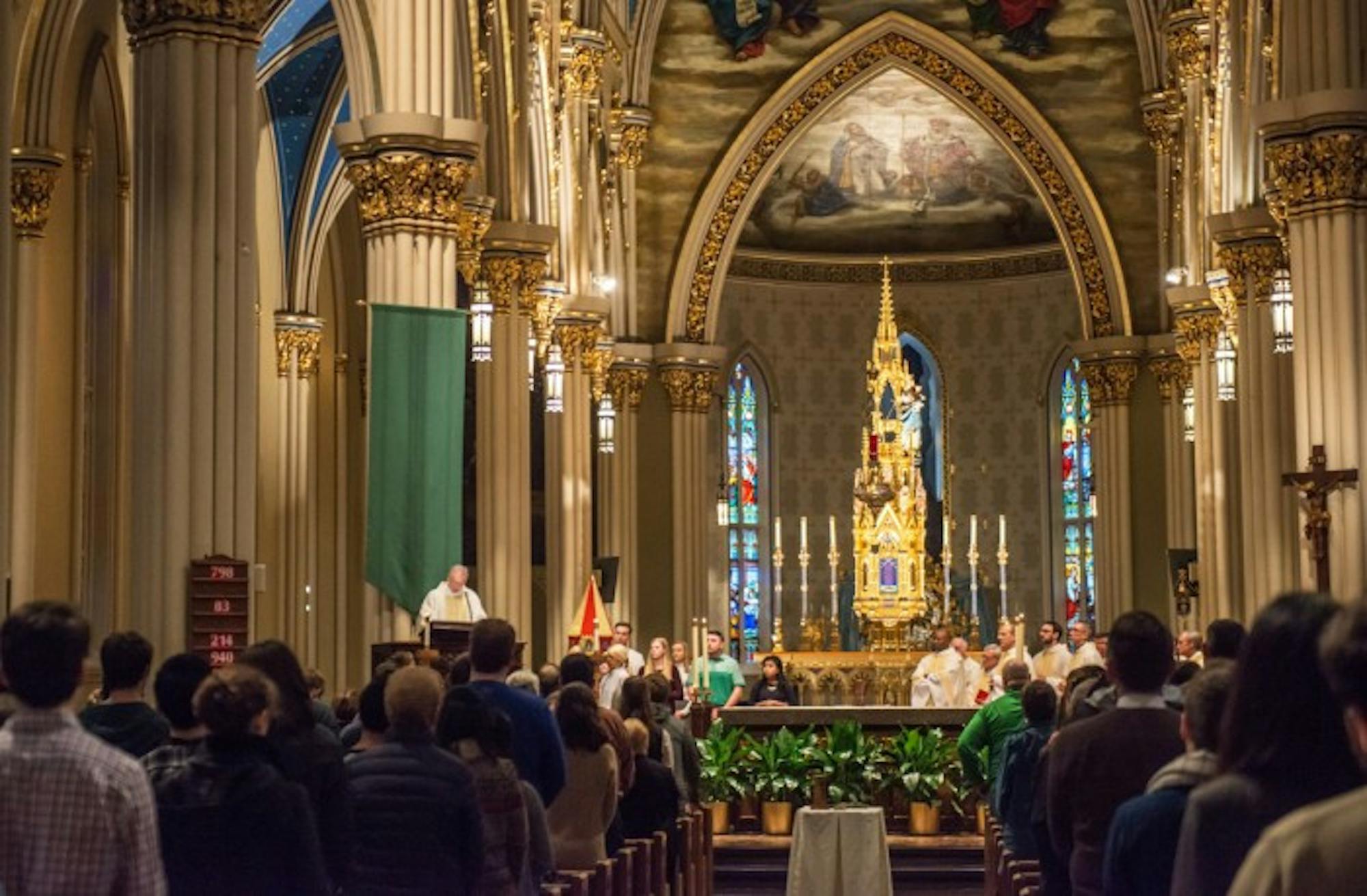At a Mass for immigrants and refugees at the Basilica of the Sacred Heart on Monday night, associate professor of theology Fr. Daniel Groody said the United States’ and Catholics’ attitude towards immigrants and refugees is of utmost importance.
“What is at stake now is not just our politics, but our very salvation,” he said.
The Mass was sponsored by Campus Ministry, the Office of the President and Student Government. University president Fr. John Jenkins presided, and student government leaders and Notre Dame Right to Life president Aly Cox read prayers and scripture, respectively.
The Mass came little more than a week after President Donald Trump issued an executive order banning the issuance of visas to nationals of seven Muslim-majority countries for 90 days and stopping the admission of refugees for 120 days, in order to review the country’s immigration vetting process.
The order, which a federal judge temporarily stayed over the weekend allowing some visa holders to enter the country, sparked protests around the world and in South Bend. It also created uncertainty for the approximately 30 students from the seven countries at Notre Dame as to whether they would be able to return home and come back, or get a job in this country.
In his homily, Groody, who is also the director of Immigration Initiatives at the Institute of Latino Studies and has written and edited several books about immigration, directly addressed the executive order, focusing primarily on its effect on refugees. He recalled Pope Francis’ pastoral visit to the Italian island of Lampedusa, where many refugees arrive in unsafe boats, in 2013. Groody said the Mass reflected Francis’ compassion for refugees.
“We care about issues of national security, the future of our country,” Groody said. “We care about human insecurity and justice and peace around the world. At the same time, we are troubled by the decisions of our political leaders, decisions being made to build walls and close doors. But our readings remind us that as we build walls around our identities, we build walls around our hearts and keep God out as well.”
Groody compared the United States’ intake of Syrian refugees to that of Jordan and Germany, who have resettled 1 million each; Lebanon, which has resettled 2 million, and Turkey, which has resettled 3 million. The U.S. has resettled 18,000.
“Now our leaders say even this is too much, that this must change to keep us safe, to protect our homes, to ‘Make America Great Again.’ On the surface this is appealing, seductive rhetoric, for who would not want to be safe and secure and prosperous?” he said. “But … closing our doors not only deprives a stranger in need, it diminishes who we are personally and collectively.”
Groody said attending to the needs of people both within and outside U.S. borders is a key part of Catholic Social Teaching.
“Even if a country has a political right to control its borders, it also has a moral responsibility to be in the world and to do good for the world,” he said.
Groody, quoting French diplomat and writer Alexis de Tocqueville, said part of what makes America great is its goodness.
“Let me say this even more strongly,” he said. “The current executive order is not just about migrants and refugees, but the core values of our country and the shaping of the soul of our nation and presently betrays the foundational principles of our forefathers.”
“Immigration is not our central problem,” he added. “Immigration is rather a symptom of deeper problems, like war, poverty, human rights violations, religious intolerance. Underneath these is what Pope Francis calls the ‘globalization of indifference’ — the feeling that, ‘The migrant and refugee crisis is not my problem. It’s not my concern,’ and in this case it’s not America’s responsibility.”
Groody quoted Pope Francis’ 2013 sermon at Lampedusa at length, in which the Pope asked forgiveness for the world’s indifference to the migrant crisis.
“In so many ways Francis reminds us that when we become so used to the suffering of others we lose to the ability to lament, we’ve lost something of our own humanity,” he said. “We’re not here to talk about politics but to proclaim and to live the Gospel, even and especially when there are ramifications relating to the political discord of our society.”
Groody invoked Jesus Christ as both an example of an immigrant and as a model of compassion.
“So we do so not just out of humanitarian concern, but response to the God who first showed us and came to our world as a migrant from Nazareth.”
At Pope Francis’ Mass in Lampedusa in 2013, a special chalice was used which was made from driftwood from a recent shipwreck that resulted in the deaths of hundreds of migrants. One of the chalices used for communion wine at the Notre Dame mass was also made of driftwood from Lampedusa, as well as mesquite wood from the American Southwest, another site of mass migration.
Those attending the Mass were also encouraged to touch a piece of a boat placed in the center aisle of the Basilica, process to the Grotto after the Mass for further prayer and then attend an information session and short film about Syrian refugees at LaFortune Student Center.
Mass addresses national attitudes towards immigration
Katelyn Valley
Katelyn Valley | The Observer









